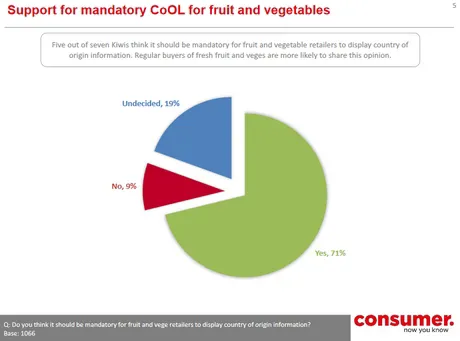The passing of Country of Origin Labelling (CoOL) legislation in the New Zealand parliament this week is a major win for the country's consumers, according to peak industry body, Hort NZ.
The Consumers’ Right to Know (Country of Origin of Food) Act passed its third reading in parliament on Wednesday and Hort NZ CEO Mike Chapman says it's all about better informing consumers what fresh produce is locally grown, compared to imports.
"It's fantastic, I'm ecstatic, this is really good news," Mr Chapman said. "This isn't a silly bureaucratic rule - this is an important piece of consumer information; knowing where your bit of fruit and vegetables comes from. We have been really keen on CoOL for our fresh fruit and vegetables. Virtually every other country we export to around the world, has CoOL. We are very proud of our produce when we send it overseas, and we are very happy to say 'Made in New Zealand' or 'Grown in New Zealand'. However, when it came to at home, it wasn't a requirement."
The legislation now plans for a Consumer Information Standard to be developed, which will set out the exact requirements. But it is believed that it will be similar to the Australian system, which features a kangaroo along with a graph showing a percentage number next to it. Mr Chapman believes producers will be given generous leave times to convert their labels over to meet the new requirements.
The move to introduce Country of Origin Labelling was first discussed in 2002 when then Greens MP Sue Kedgley collected a petition with 35,000 signatures. Since then it has been adopted by subsequent Greens MPs Steffan Browning and Gareth Hughes, with it introduced it as a Private Members Bill in 2016. Mr Chapman says it faced some opposition over the years, mainly on the grounds of trading concerns.
"Even though we are advocates for it, we always try and understand what the people opposed are worried about," he said. "The big issue was they thought under the World Trade Organisation (WTO) rules this may be a contravention. There was a WTO case involving the United States a few years ago where they had a CoOL system that was very strongly promoting the U.S. product, as opposed to just saying 'Made in U.S.A'. So that was a concern because NZ is keen on being very compliant with WTO rules, in both fact and spirit, and the concern was that this could be in breach. So, we had to do a lot of work explaining that it depends on the wording, and looking at other countries that have a CoOL system that don't have a WTO issue."

Source: Hort NZ CoOL Survey Results 2017
A study undertaken by Hort NZ found that 71 per cent of consumers supported a mandatory CoOL system, given the country had only been operating under a voluntary system. While 47 per cent ‘strongly agreed’ that knowing where their fruit and vegetables came from was important.
"A bit over a third said when they looked for CoOL on fresh fruit and vegetables, they couldn't find it," Mr Chapman said. "The supermarkets were well-intentioned, but sometimes those intentions didn't always come to fruition. If you have a scheme where people have to do CoOL and do it accurately and comprehensively, they tend to get better compliance than a voluntary scheme, and that's what the survey came back saying."
Another factor Country of Origin Labelling can assist with, according to Mr Chapman is education, particularly surrounding seasonality of fruit and vegetables.
 "There isn't an understanding that produce, for example lettuces, don't grow year-round," he said. "So, when it's the middle of winter, there is not a lot of lettuces about, that's because it's not a great season to grow lettuce. Having CoOL will, I hope, explain to people that if they look in the supermarket and see lettuce from other countries, understand that it's not the season to grow them in NZ. The same with tomatoes and capsicums. I think it will improve the consumers understanding, and hopefully relate to the consumption of fresh fruit and vegetables."
"There isn't an understanding that produce, for example lettuces, don't grow year-round," he said. "So, when it's the middle of winter, there is not a lot of lettuces about, that's because it's not a great season to grow lettuce. Having CoOL will, I hope, explain to people that if they look in the supermarket and see lettuce from other countries, understand that it's not the season to grow them in NZ. The same with tomatoes and capsicums. I think it will improve the consumers understanding, and hopefully relate to the consumption of fresh fruit and vegetables."
But Mr Chapman believes the new measures are mainly aimed at the consumer, rather than improving market competition for locally grown products.
"When our supplies are plentiful, there aren't imports, and when our supply isn't plentiful, there are imports - so it's not a competitive thing," he said. "Relatively speaking, locally grown (fresh produce) is more cost effective than imports, generally speaking. So, it's not about driving better income, it's not about driving better competition between us and offshore fruit and vegetables. It's about informing consumers better."
Hort NZ is encouraging the government for early adoption of these CoOL requirements being applied to fresh fruit and vegetables, before the more complex manufactured and processed foods.
New Zealand's total horticulture industry value (excluding wine) is $5.7 billion. Total fruit value is $3.79bn ($2.82bn exports and $0.97bn domestic sales) and total vegetable Value is $1.89bn ($0.62bn exports and $1.27bn domestic sales).
 For more information:
For more information:
Mike Chapman
Hort NZ
Phone: +64 4 472 3795
info@hortnz.co.nz
www.hortnz.co.nz
